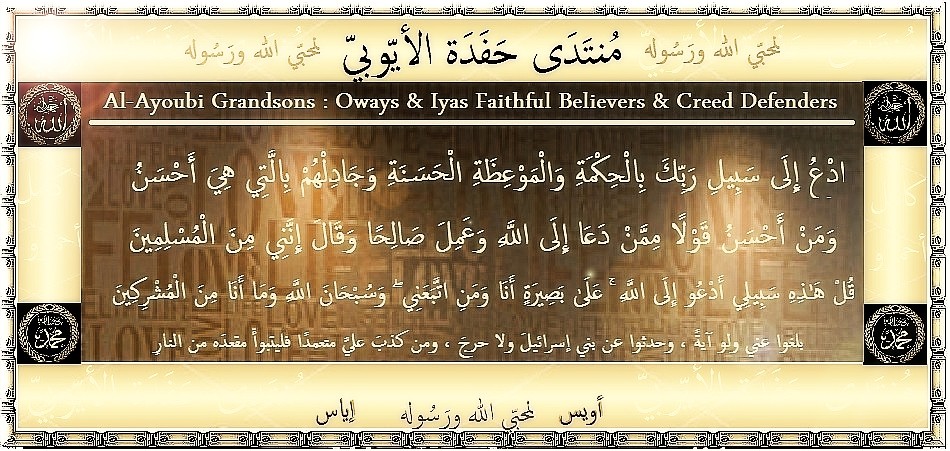ahmaroayoubi
كاتبة متميزة واميرة الاشراف


عدد المساهمات : 307
تاريخ التسجيل : 03/01/2012
العمر : 55
 |  موضوع: Abdullah ibn Mubarak عبد الله بن المبارك موضوع: Abdullah ibn Mubarak عبد الله بن المبارك  الجمعة مارس 30, 2012 10:21 am الجمعة مارس 30, 2012 10:21 am | |
| Abdullah ibn Mubarak
Throughout the history of Islam there have been renowned personalities who have dedicated their life to the preservation of Islam against the tide of disbelief and deviation. In the early period of Islam, the preservation of the Hadith (traditions) was an indispensable element, which needed to be preserved in order to safeguard the deen (religion). Thus, Abdullah Ibn Mubarak was one of these personalities who ensured that Islam was presented to us today in the same form it had been 1400 years ago.
Abdullah Ibn Mubarak was born in 118 hegira / 726 CE, in the town of Marwa. In his childhood he studied elementary subjects, such as writing and arithmetic, which were considered as essential. Thereafter, his life took an unusual turn, thus, he became occupied in the pleasures of the world. He lived a luxurious life of jest and play, until one night, when he received a wake up call from Allah Ta’lah. As a routine custom one-day he invited his friends for a party in his orchard, here, they played and joked until they were overpowered by sleep. However, unlike before, in his sleep he saw a bird perched on the tree reciting a verse in which Allah Ta’lah sends an admonition to his servants:
Has not the time come for the hearts of those who believe to be affected by the reminder of Allah, and that, which has been revealed of the truth. (Quran 57:16)
The message carried by this majestic verse was so profound that it led Abdullah Ibn Mubarak to discard the comforts of this temporary world in order to search for eternal bliss. He instigated his thoughts into actions by, firstly, breaking the musical instrument he had in his hand and this was his first step in Zuhad (asceticism).
Abdullah Ibn Mubarak was now on a new path in search of sacred knowledge, especially Hadith (traditions). He travelled the entire Islamic world in order to preserve Hadith, until Abu Usama declared that ‘I have not seen a person searching for Hadith throughout the corners of the world like Abdullah ibn Mubarak. Consequently, he became the undisputed authority in the science transmitting Hadith (traditions). He attained such a lofty rank that the critics of this science unanimously agreed on the fact that he was of a sound nature and a possessor of an extraordinary memory. To achieve such acceptance is unparalleled in the history of Islam; however, this status was necessary for a person who was to be the torch barer of the Hadith. The renowned scholar of critical analysis of transmitters, Yahya Bin Maeen, has wonderfully illustrated his noble traits:
He (Abdullah ibn Mubarak) was intelligent, cautious (in narrating Hadith), trustworthy and a true scholar of Hadith. It is sufficient to know (his status) that many narrated from him, thus he is one of the narrators of Imam Bukhari and the rigorous conditions applied by Imam Bukhari in the verification and sound nature of a narrator is all well known, therefore there is no reason to expound on it.
Hence, he was a firm pillar in the establishment of Hadith, so whenever there was a narration he would take extreme measures to ensure the authenticity of Hadith before he would narrate it. This is why his legendary statement still resonates today in the hearts and minds of the scholars of Hadith that ‘Isnad (the chain of narration) is a part of Deen (religion), if there was no Isnad, then everyone would say what they desired’. Thus, everyone, including the king knew his extreme precaution. Thus, the Abbasi King Haroon Al-Rashid once retorted to an atheist that was brought on trial, who had claimed to have fabricated over one thousand Hadith, none of which were established;
‘What is your rank in compression to Ishaq Al-Farazi and Abdullah ibn Mubarak? O Enemy of Allah! They will separate them through a sieve, letter for letter (from the collection of Hadith)’.
Not only did Abdullah ibn Mubarak gain proficiency in Hadith, but also in Fiqh (jurisprudence) he was a master in his field. The fact that he studied under the greatest living jurists of his time, including men like Imam Abu Hanifa, Imam Malik and Sufyan Thawri, shows that he had developed an appreciation of this science.
He was also praised for being a prolific writer in his time; Imam Dhahabi states that his books include Kitab Al-Arbaeen, Kitab Tareek, Kitab Jihad and Kitab Zuhad wa Raqaiq. Unfortunately all of his written works are not published today.
One of his greatest assets was his Zuhad (asceticism) and the desire for the hereafter. Even though, he had an annual yearly income in excess of one thousand Dinars. All of which he spent in the path of Allah. This is exemplified in his excursions to Makkah for Hajj, while on the journey he would lavishly spend on his associates and fellow travellers despite the fact that he was continuously fasting.
Finally, in the year 181 hegira / 797 CE, during the month of Ramadan Abdullah ibn Mubarak departed the world while striving hard in the path of Allah. The endeavours he took during his life are numerous and cannot be covered here. However, a glimpse into the life of this great Imam testifies how taking precaution in the narration and narrators preserved the Hadith from being marred with taint. We are therefore indebted to the service rendered by our pious predecessors who fulfilled their rights upon us and especially Abdullah ibn Mubarak. | |
|




